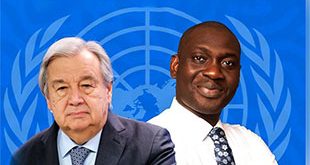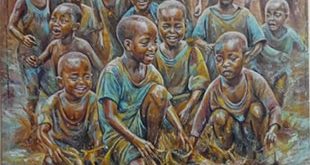
By Peter Martell
A UN base beside the capital’s airport has around 17,000 people gathered for protection
South Sudan’s capital has three towns: the first is the dusty streets of Juba, largely calm but where the crackle of gun fire still rings out at night after three weeks of violence. But the other two are foul smelling camps totaling some 30,000 people squeezed in the grounds of United Nations bases, an enclave crowded so tight that people have to take turns to sleep on the ground in flimsy shelters made of cardboard or ragged cloth.
We came here because they were killing our people,” said Nyabor Gatwetch, 45, a mother of five, who fled her village on the outskirts of Juba shortly after fighting broke out on December 15.
“Soldiers were fighting each other with guns… but then they were also targeting our people.”
The fighting began on December 15 as a clash between army units loyal to the president and those loyal to his former deputy, and has escalated into fighting between government troops and a loose alliance of ethnic militia forces and mutinous army commanders.
Reports of grim tales of house-to-house searches, killings and executions are common in the camp.

“I’ll never go back home,” said Gatwetch, her face covered in a mask after working to clean overflowing latrines, newly dug by the UN but which with the crowds, are soon full to capacity.
They’ll kill me outside
Atrocities have been committed by both sides, and the UN has said it will investigate crimes against humanity thought to have been committed over the past three weeks.
Lines of colourful washing flutter on the razor wire that surrounds this UN peacekeeping base, what the crowds here believe is the only thing keeping them safe in this tiny site.
It was until last month a sports ground and running track for the peacekeepers.
“Now it’s become a town within a city,” said Toby Lanzer, UN top aid official in South Sudan, shouting as yet another truck honked its horn to part the crowds, bringing in badly needed drinking water.
On the crowded paths, Japanese UN peacekeepers push through with an armoured personnel carrier, the top gunner alert but waving at children to apparently reassure them.
“It was about three weeks ago and hostilities were raging and people just started flooding towards our gates,” Lanzer added.
“These are people who feared for their safety… we opened the gate never realising how many people would come in, and people are still arriving.”
Many fled their homes with no time even to pack, and include civil servants, businessmen and even high ranking officials among the crowds.
Too frightened to leave
Here at the UN base beside the capital’s airport, around 17,000 people gathered for protection, while across the country, some 57,000 are now in UN bases.
Rumours swirl inside the camp, many fearful of attacks that forced them to seek shelter here.
“They came for us, killing our brothers, my fellow soldiers,” said one man, who said he was an army officer, pulling out military documents as proof.
“I saw one shot and then as I run they were firing towards me too,” he said, asking not to be named.
Some inside the camp are already trying to build some semblance of an ordinary life, setting out electric power sockets powered by noisy thumping generators to charge mobile telephones, or selling cups of tea.
“We have to do what we can to survive,” said William Taban, charging a fee to people to revive their telephone batteries.
Many are desperate for news of their family, calling areas where fighting is still raging including the key oil-producing Unity state.
“I call my family there, but there is no reply,” Taban added.
“I tell myself it is because the phone masts have been damaged, but I cannot rest for fear that the terror of my dreams has come true.”
Military and UN helicopters fly overhead, scattering the crying hawks circling above the camp spying for scraps of food or raiding rubbish areas.
Aid workers are struggling to cope, even though massive efforts have been made.
“This camp sprang up overnight, at the beginning conditions were awful and sanitation was terrible… but over the days and weeks we have been working with our partners to address the needs,” said Doune Porter, from the UN children’s agency Unicef, waving at a newly dug line of latrines it has built.
Nearby, children swim in the black water of a ditch as mothers try to wash clothes from drainage pipes dripping slime.
“This is not what we dreamt for our new nation,” said James Puoch, showing his T-shirt printed to celebrate South Sudan’s independence from Sudan in 2011. “Everything has fallen apart.”
 The Independent Uganda: You get the Truth we Pay the Price
The Independent Uganda: You get the Truth we Pay the Price




